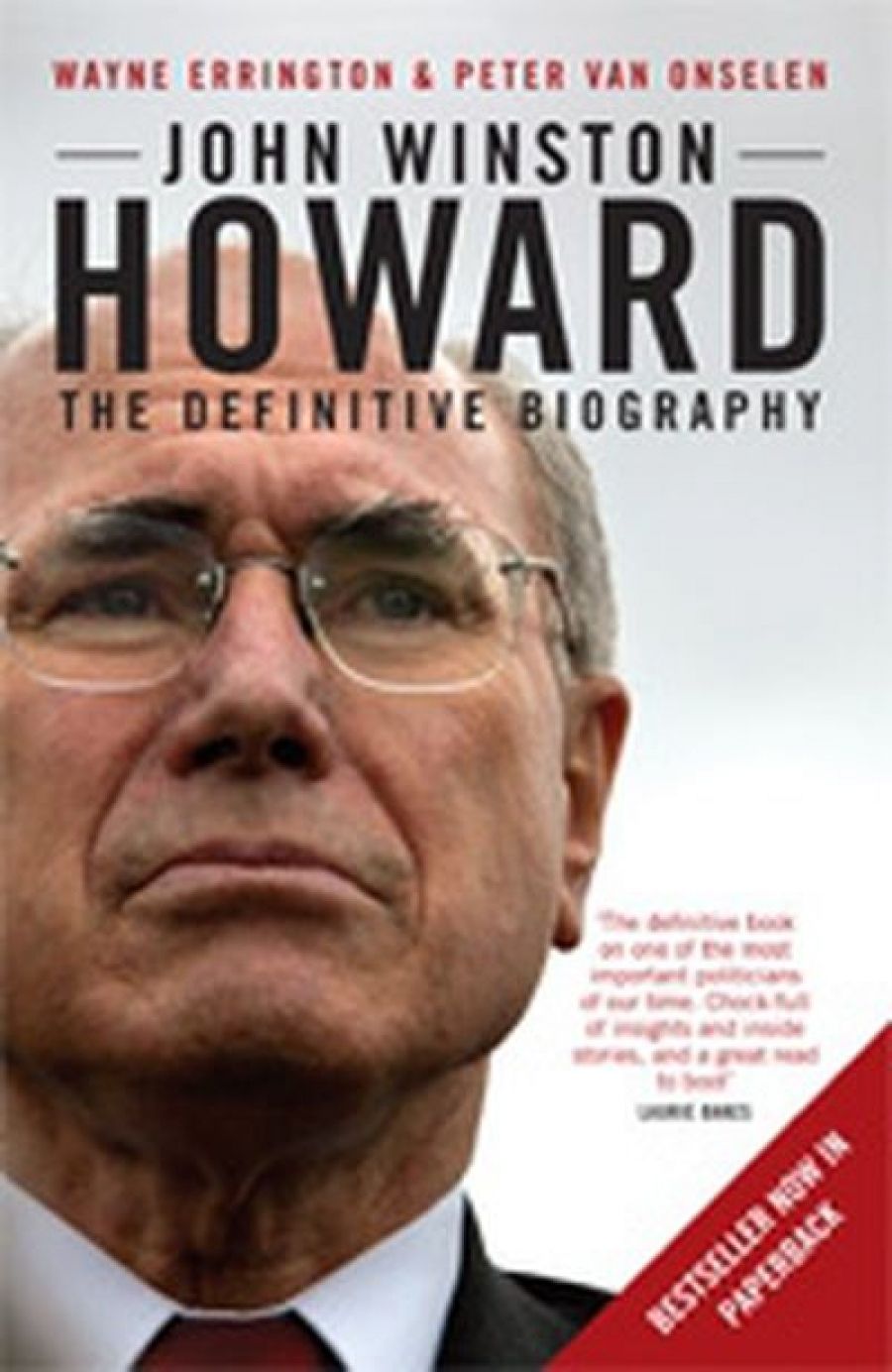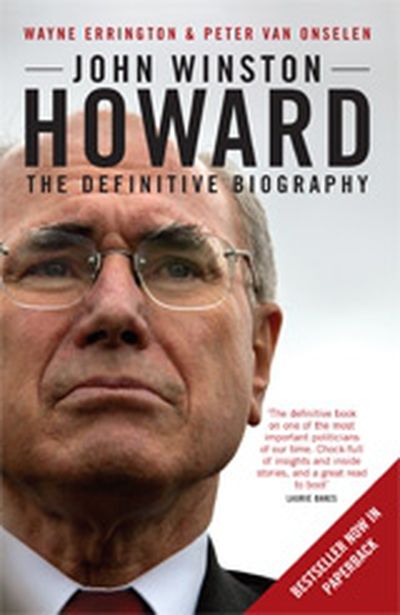
- Free Article: No
- Contents Category: Biography
- Review Article: Yes
- Online Only: No
- Custom Highlight Text:
Contemporary biography presents many challenges, even more so when the subject is a politician who is still in office. It is, at best, a progress report: necessarily provisional both in its analysis and its attempt to anticipate the weightier judgment of history. By its very nature, it inclines more towards journalism than towards scholarly assessment.
- Book 1 Title: John Winston Howard
- Book 1 Subtitle: The biography
- Book 1 Biblio: MUP, $49.95hb, 458pp
- Book 1 Cover Small (400 x 600):

- Book 1 Cover (800 x 1200):

Familiar he most certainly is, but do we know him in any meaningful sense of the word? This is the task that biographers Wayne Errington and Peter van Onselen set themselves. There are, they tell us at the outset, many John Howards; he is, like all of us, impossibly complex, seemingly contradictory. and multifaceted. But in the attempt to peel away the layers from the Howard onion, it is always another politician that is revealed, and therein lies both the strength and the weakness of this study: it is not a life so much as a political biography.
If we wait for the inner man to be revealed, we will wait in vain; he is the Godot of contemporary Australia. He (Howard/Godot) might or might not exist. The achievement of the book is to reveal, slyly and seldom explicitly, the profound hollowness at the core of the study; a man who is a politician and nothing else, a man who has plotted and schemed and intrigued rather than lived.
The flaw, however, is that it is a book primarily and fundamentally about power and its relentless pursuit. The authors, as political scientists, are on firm ground here, but is the general reader prepared for the ride? Only those in close proximity to politics appreciate its consuming fires, its single-mindedness, its callous rejection of most of the accepted conventions of social intercourse. It is a Hobbesian world of war of all against all: grubby rather than heroic; all spoils to the victor.
John Howard is that victor. First, he waged war in his own party, undermining the Andrew Peacock leadership, and in doing so inflicting considerable damage on the Liberal Party. Wresting the leadership from Peacock in 1985, Howard wore the crown uneasily until, in 1989, he was deposed in a palace coup by Peacock’s supporters, who had never forgiven him. He was passed over twice by a party in search of a new start until finally, confident that the times would suit him, he was the last man left standing.
This tells us something about the highly pragmatic nature of Australian conservatism. Despised, derided, even loathed by those with whom he had fought so doggedly, for ideological as well as personal reasons, Howard was restored to the leadership by those very people who had toiled to overthrow him, and secondly, to block his return to the leadership. Just as the protectionists and free traders had called a truce in 1909, albeit uneasily, to battle a common Labor enemy, so too did the conservatives in 1995, when they had a sniff of victory.
It was indeed fortunate that his Labor opponent was the arrogant Paul Keating, who must take much of the responsibility for Howard’s resurgence. Keating, a gut-instinct streetfighter, lost touch with the people, and Howard swooped with a finely honed populism. A tribal man of vision with a loose mind gave way to a tribal man of no vision with a one-track mind: power at any cost. Howard was the less principled, more ruthless of the two. For Keating power was always a means; to Howard it was an end.
Howard then waged war on liberal Australia – or at least on those aspects of Australia of which he disapproved. These included the unions, indigenous people, the public service, the states, ATSIC, gays and lesbians, asylum seekers, republicans, Muslims, Peter Costello, moderates in his own party, NGOs, the United Nations, intellectuals, universities, teachers, the judiciary, government accountability, the ABC and, eventually, truth itself. From the Tampa affair, the Australian Wheat Board scandal, the smearing of Justice Kirby to the Dr Haneef case, the Howard government has been marked by character assassination and plain lying. On the evidence, Howard clearly dissembled about his arrangement with Costello over the leadership.
Errington and van Onselen are by no means blind to the way in which Howard operates: the book reveals an extraordinary persistence and a modus operandi to match it. But they are remarkably charitable in the conclusions they draw, albeit with reservations, that Howard is, in the end, ‘a thoroughly modern political leader’. Yet their summing up is coyly ambivalent; sanguine, but phlegmatic. Are the two authors of a different mind?
They show that Howard feels, bleeds, hurts (if only for his thwarted ambitions): but there is not so much a pulse as a current. Is there less than meets the eye to Australia’s resilient prime minister? The trouble with such a one-dimensional figure as Howard – that is, politician and nothing else – is that he is intrinsically uninteresting. One is reminded of e.e. cummings’s line: ‘A politician is an ass upon which everyone has sat except a man.’
In terms of political biography, it might have been useful to know more about Howard within that stream of conservatism that is peculiar to New South Wales, the confrontational, combative conservatism that derives from George Reid. We might also have benefited from a closer examination of Howard’s relationship with Malcolm Fraser, the man who plucked him from obscurity. Lastly, almost totally neglected is Howard’s close relationship with big business that has given those strident bodies such as the Institute for Public Affairs, the Business Council of Australia and the Australian Chamber of Commerce and Industry virtual seats in cabinet. This, ultimately, is what distinguishes the pragmatic Howard from the pragmatic Menzies, who regarded business as just another voice among the competing clamour.
John Winston Howard, above all, demonstrates how power cannot so much corrupt as consume. Howard, despite a brave attempt, remains obscure, defined purely by his own ambition. The book is an admirable, if not wholly successful, attempt to explain these strange and disconcerting times, and the figure who has done much to shape them. A penny for the guy.


Comments powered by CComment